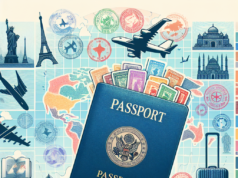
All About Citizenship and Immigration Canada
Citizenship and Immigration Canada (CIC) is the department of the Canadian government responsible for immigration, refugees, and citizenship. CIC aims to promote economic growth, social stability, and cultural diversity by facilitating the entry and integration of people from around the world to Canada. In this article, we will provide an in-depth overview of citizenship and immigration in Canada, including the latest updates and information on eligibility requirements, procedures, and benefits.
Canadian Citizenship
Citizenship is a critical aspect of national identity and gives individuals the right to participate fully in Canada’s social, economic, and political life. Obtaining Canadian citizenship is a significant milestone and provides several advantages, including the right to vote, obtain a Canadian passport, and access government services and benefits.
Requirements for Canadian Citizenship
To be eligible for Canadian citizenship, applicants must meet specific criteria. The following are the requirements to be eligible to apply for Canadian citizenship:
– Be at least 18 years old
– Be an authorized permanent resident of Canada
– Have lived in Canada for at least 1,460 days (four years) in the past six years
– Be able to communicate in English or French
– Have sufficient knowledge of Canada’s history, institutions, values, and rights
– Not have been convicted of a crime
Canadian Citizenship Application Process
The Canadian citizenship application process involves several steps, including submitting an application, taking a language and knowledge test, and attending a citizenship ceremony. The following are the steps involved in the Canadian citizenship application process:
1. Complete the Application: You need to fill out the citizenship application form, which is available on the Government of Canada’s official website. The application form requires information such as passport details, application fee, and contact information.
2. Language and Knowledge Test: Upon submitting the application, you will be required to sit for a language and knowledge test. The language test assesses your ability to communicate in either English or French. The knowledge test assesses your understanding of Canada’s history, values, institutions, and rights.
3. Citizenship Ceremony: After passing the language and knowledge test, you will be invited to attend a citizenship ceremony, where you take the Oath of Citizenship and receive your citizenship certificate.
Canadian Citizenship Benefits
Obtaining Canadian Citizenship comes with several benefits, including:
– The right to vote in federal, provincial, or territorial elections
– Eligibility for Canadian and U.S. passport
– The ability to obtain a Canadian passport
– Access to Canada’s provincial and federal healthcare services
– The opportunity to run for public office
Canadian Immigration
Canada is a welcoming country that opens its doors to immigrants, refugees, and asylum seekers. Immigration to Canada provides individuals with opportunities to enrich their lives by contributing to Canadian society, advancing their economic goals, or seeking protection from persecution in their countries of origin.
Canadian Immigration Paths
Canada offers several immigration pathways to individuals with varying needs and backgrounds. Some of the immigration pathways include:
1. Express Entry: The Express entry is an online platform that enables skilled workers to apply for permanent residency in Canada. The Express Entry system assesses candidates based on their skills, age, language proficiency, work experience, and education.
2. Family Sponsorship: Individuals with Canadian citizenship or permanent residency can sponsor their spouse, common-law partner, dependent children, parents, or grandparents to come to Canada and become permanent residents.
3. Provincial Nominee Programs (PNPs): PNPs are programs through which Canadian provinces and territories select foreign nationals to meet the specific labor market requirements of their respective provinces. PNPs are available to skilled workers, business entrepreneurs, investors, and students.
4. Refugee and Asylum: Canada provides refuge and protection to individuals who flee their countries of origin due to persecution, war, or human rights abuses. Individuals seeking asylum in Canada go through a rigorous process that assesses their eligibility for refugee status.
Canadian Immigration Eligibility Requirements
The eligibility requirements for immigration to Canada vary depending on the immigration pathway. The following are the general requirements for immigration to Canada:
– You must pass a criminal record check
– You must meet health requirements
– You must have sufficient language proficiency in either English or French
– You must have a valid job offer or possess the required skills and experience as per the immigration pathway
Canadian Immigration Process
The Canadian immigration process involves several steps, including submitting a complete application, passing a medical and security check, and attending a visa interview. The following are the steps involved in the Canadian immigration process:
1. Submit Application: You need to fill out an application form and submit the required documents, such as passport, proof of work experience, language proficiency certificates, and educational documents.
2. Security and Medical Check: After submitting the application, you will undergo a security and medical check to ensure that you are admissible to Canada.
3. Visa Interview: Upon passing the security and medical check, you may be required to attend a visa interview to provide additional information and demonstrate your eligibility for immigration.
Canadian Immigration Benefits
Immigration to Canada offers several benefits, including:
– Access to high-quality education and healthcare
– Opportunities to work and live in a multicultural and diverse society
– The ability to bring family members to Canada and reunite with loved ones
– Eligibility for Canadian citizenship after meeting specific requirements.
Conclusion
In conclusion, Canadian citizenship and immigration provide avenues for individuals from all over the world to access opportunities for a better life. From the eligibility requirements, application process to the benefits of Canadian citizenship and immigration, it is clear that citizenship and immigration Canada is a vital component of the country’s social and economic development. By understanding the latest updates on eligibility requirements, procedures, and benefits, individuals seeking to immigrate or become Canadian citizens can confidently navigate the system.
Citizenship and Immigration Canada is an organization that was established to promote the ideals and values maintained by Canadians, while helping individuals achieve citizenship and immigration to Canada. Canada immigration and citizenship laws allow individuals to immigrate to Canada, if they are eligible in one of the excepted categories.
There are six different categories in which immigrants can be placed, including skilled workers, experience class, entrepreneurs, provincial nominees, and sponsored families. If an individual wishes to immigrate to Canada and reside in a location other than Quebec, he/she can achieve this by maintaining a desirable profession or by establishing a company in Canada. However, under Canada immigration and citizenship laws, there are strict regulations regarding who is able to qualify in these categories.
In order for an individual to achieve citizenship and immigration to Canada under the Business Immigration category, an individual must manage a successful business in Canada, or make an extensive investment of over C$400,000. Within this category, an individual can qualify as an entrepreneur, self-employed individuals, or an investor. In order for an individual to qualify under the skilled worker category, he/she must possess an appropriate education, desired work experience, and have extensive knowledge of the English or French language.
An individual who has worked or studied in Canada temporarily may also qualify for permanent residence in the country, under the experience class category. If an individual desires to permanently reside in Canada, he/she should review the information provided by Citizenship and Immigration Canada.

























